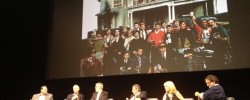Review: Outside Satan (2011)
Cast: David Dewaele, Alexandre Lemâtre, Christophe Bon
Director: Bruno Dumont
Country: France
Genre: Drama
Official Trailer: Here
Editor’s Note: Hors Satan opened in limited release today, January 18th
It starts with a bang. The bang which begins Bruno Dumont’s Outside Satan—or at least sets in motion the closest thing to a plot that it has—is that of a shotgun, clasped firmly in the hands of a mysterious drifter who has taken residence on a beach beside a small French community, as he shoots down the abusive stepfather of a young woman who follows him devoutly. These are details—some of them only inferred—we slowly learn as the film winds on, following this pairing in the aftermath of their brutal act as they traipse about the vast rural landscape, stopping here and there to kneel in prayer.
Dumont’s is a style of filmmaking with little regard for action, his story—insofar as it can be called that—concerned less with causality than with exploring these characters as ciphers through which thematic expression is broached.
 The young woman’s attraction to this ethereal drifter is much like that of the audience to the film: fixated despite the frustrating inexplicability of its nature. Dumont’s is a style of filmmaking with little regard for action, his story—insofar as it can be called that—concerned less with causality than with exploring these characters as ciphers through which thematic expression is broached. Virtually without dialogue for its first fifteen minutes, this is a film of minutiae, concerned with the tiniest fragments above the larger whole, which incorporates further murders and the sort of grand actions most directors would make the focus of the picture. Not Dumont: he is an orchestrator who lurks in the shadows, a grand puppeteer pulling the strings on this strange scenario, guiding his characters and his audience’s eyes with the hypnotic slowness of his storytelling; his evanescent approach may well elude, even infuriate, yet such is his placid provocation that we can’t help but commit to this journey, no matter where it may take us.
The young woman’s attraction to this ethereal drifter is much like that of the audience to the film: fixated despite the frustrating inexplicability of its nature. Dumont’s is a style of filmmaking with little regard for action, his story—insofar as it can be called that—concerned less with causality than with exploring these characters as ciphers through which thematic expression is broached. Virtually without dialogue for its first fifteen minutes, this is a film of minutiae, concerned with the tiniest fragments above the larger whole, which incorporates further murders and the sort of grand actions most directors would make the focus of the picture. Not Dumont: he is an orchestrator who lurks in the shadows, a grand puppeteer pulling the strings on this strange scenario, guiding his characters and his audience’s eyes with the hypnotic slowness of his storytelling; his evanescent approach may well elude, even infuriate, yet such is his placid provocation that we can’t help but commit to this journey, no matter where it may take us.
David Dewaele embodies the elusive nature of this character with magnetic allure, the aura of mystery which enshrouds him making all the more fascinating his resignation to this isolated rural existence. Never once does this seem an actor inhabiting a role, Dewaele’s determined devotion to the performance ensuring his slow dissolution into this character, and it into him. He is at once innocuous and imposing, a figure of benign benediction as much as one of uneasy threat; never are we sure just what he might do next, and whether we should fear the possibilities. His natural leadership is as much a cause for concern as for comfort, the good and the evil he does entwined in a complex rumination on faith: who is this man, and are his spiritual proclivities to be taken as some earthly embodiment of heaven or hell?
His landscapes are grand tableaux, his characters cast in silhouette against the great immensity of the natural world—basked here in fire, there in fog—frozen like figures in a magnificent, microcosmic diorama.
 It’s never clear just to whom or to what these characters pray, Dumont’s narrative suggestive of both God and Satan, his framing indicating perhaps the landscape itself. Is this man a prophet or a demon, a messenger from on high or a tormentor from below? The fluidity of this character and his actions makes this question the central thesis of the film, his regular crossing of the good-evil divide Dumont’s way of scrutinising that line and questioning the boundaries of morality. Are the ills he commits justified by the benefit of their outcome, or the honour of their intent? Dumont’s is not a film that offers easy answers, nor indeed any at all, its constant quietude as it simply observes allowing each viewer to relate their own outlook on life to the events the play out before them.
It’s never clear just to whom or to what these characters pray, Dumont’s narrative suggestive of both God and Satan, his framing indicating perhaps the landscape itself. Is this man a prophet or a demon, a messenger from on high or a tormentor from below? The fluidity of this character and his actions makes this question the central thesis of the film, his regular crossing of the good-evil divide Dumont’s way of scrutinising that line and questioning the boundaries of morality. Are the ills he commits justified by the benefit of their outcome, or the honour of their intent? Dumont’s is not a film that offers easy answers, nor indeed any at all, its constant quietude as it simply observes allowing each viewer to relate their own outlook on life to the events the play out before them.
It’s a credit to the directorial assurance of Dumont that he so seamlessly weaves his intermittent scenes of bloody brutality into the overarching reserved realism of his aesthetic; there is to his violence a matter-of-fact presentation akin to that of Haneke, unflinchingly portraying the heinous ugliness of the world with as much loyalty as he does its transfixing beauty. His landscapes are grand tableaux, his characters cast in silhouette against the great immensity of the natural world—basked here in fire, there in fog—frozen like figures in a magnificent, microcosmic diorama. Dropped to their knees in prayer, to what god or devil we know not, they are for all the oddity of their interactions just lost human beings: hands clasped in quiet desperation, crying out for a path to follow in the great wilderness of life.
Related Posts
![]()
Ronan Doyle
![]()
Latest posts by Ronan Doyle (see all)
-
http://www.facebook.com/people/Chris-D-Misch/28134555 Chris D. Misch



























